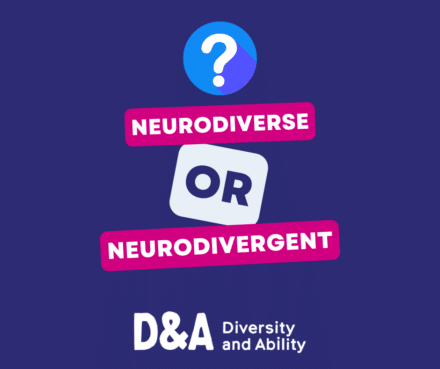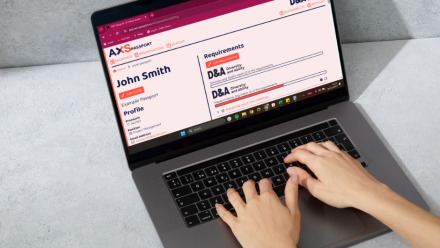Neurodiverse or Neurodivergent?
11th December 2023 by Scarlett James

Labels connect us to the communities we sometimes spend our entire lives pursuing. They enable us to access much-needed support that we may not have been aware of. Yet, they can also lead to support being restricted behind labelled doors.
When we discuss labels, we need to be especially mindful of the language we choose to represent them. An example of this is the distinction between “Neurodiverse,” “Neurodiversity,” and “Neurodivergent.” Additionally, there’s “Neurotypical.”
This is a question we have asked before when we think about whether to capitalise the D in Disabled. Why do people opt for one label over another? And why does our company, D&A, have a preference?
Some definitions:
- Neurodiversity: ‘A biological truism that refers to the limitless variability of human nervous systems on the planet, in which no two can ever be exactly alike due to the influence of environmental factors.’
- Neurodivergent: ‘people whose brain differences affect how their brain works. That means they have different strengths and challenges from people whose brains don’t have those differences.’
- Neurotypical: ‘A person is an individual who thinks, perceives, and behaves in ways that are considered the norm by the general population.’
Using “Neurodiverse ” to describe an individual has been considered a grammatical error or misusage. However, at D&A, we continue to refer to our collective ‘Neurodiversity” with intention. Our CEO, Atif, often says, “We are all neurodiverse; but we’re not all marginalised by it.”
Some might argue that “neurodivergent” provides a way of recognising this marginalisation. But what we recognize at D&A is that, semantically, “divergent” implies a deviation from the norm, especially when used in conjunction with “typical”. Segmenting existences into ‘neurodivergent’ vs ‘neurotypical’ inevitably creates “us and them” rhetoric. For many within the marginalised group this in itself can be healing. They have been dismissed as ‘other’ their entire lives. It can be powerful to reclaim that othering. However, when we establish such rigid boundaries, we may exclude those who are neurodiverse but who don’t have the social capital to access a label.
For many, accessing a diagnosis requires:
- Presenting in a way that makes their neurodiversity explicit to others and their understanding of neurodiversity.
For instance, a young white man behaving in a disruptive way in class, fidgeting with poor attention, is likely going to be recognised as potentially having ADHD. Whereas a Black female who gets good grades in school, but struggles to complete homework and gets distracted talking, is more likely to be seen as the ‘loud Black girl’. - Time
If not detected by educators, for an adult to receive a diagnosis they must, in the UK, be referred through their GP. The average waitlist for many diagnostic assessments currently is up to 5 years. On top of this it requires time out of work, many doctors appointments. - Legal Immigration status
For many refugees who are not yet in receipt of a legal status they are unable to access healthcare. Having support locked behind medical labels means it is completely out of reach for those unable to access healthcare. - Money
To skip the long queues or to receive a diagnosis in a country with a publicly funded healthcare system, private diagnostic assessments can cost serious amounts of money. In the UK this can be up to £1000 nevermind any treatment options individuals may choose to pursue.
- Digital AccessRead our blog with Citizens Online on the ties between disability and digital inclusion to learn more.
By using the term “Neurodiverse” and referring to the collective diversity within us all, we reinforce the idea that there is no “us and them.” We still acknowledge and celebrate the differences among us without harsh delineation, in a way that feels authentic to the social model of disability.
We want to be clear that our understanding of neurodiversity does not remove the fact that some people who are neurodiverse because of a specific condition are marginalised in a specific way.
It is not true or accurate to say things like ‘We’re all on the spectrum’, ‘Aren’t we all a little ADHD’ or ‘I’m a bit OCD’.
Feeling overwhelmed when you have a lot of tasks to complete isn’t the same as experiencing ADHD Paralysis. While the experiences that sit within these conditions may be varied, they are distinct. Simply having some traits of ADHD, OCD or Autism doesn’t mean that you have the lived experience of marginalisation associated with them. This is a separate concept to self-diagnosis (diagnosing yourself with a particular condition). There are multiple, complex barriers to diagnoses, and recognising an experience in yourself, rather than relying on hard-to-access external diagnosis, can be transformative.
Whether you prefer neurodiverse or neurodivergent is your own choice. However, we do need to be critical about how labels are used to gatekeep support and community. Especially when considering intersectionality. Intersectionality explains why neurodiversity is not going to present the same in everyone. The experience of a dyslexic Bangladeshi is going to be different to that of a dyslexic white man. For instance our CEO Atif likes to say that although both him and Richard Branson are CEOs and dyslexic, the only thing he has in common with him is a beard. One of the two is more likely to have access to a label, and thus a community and support. How do we ensure that both are in the room and able to have conversations around what support should look like?


